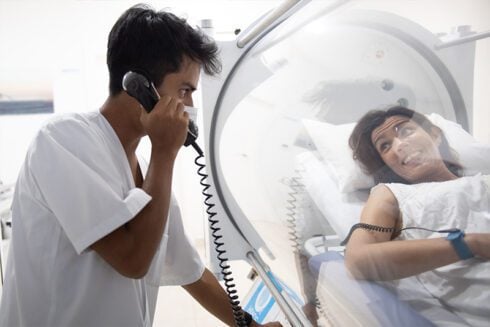A little anxiety is good for us, but many young people today are overwhelmed by emotions that feel out of control. Recent research shows this has gotten worse since the global events of late, but understanding and naming our emotions is the first step to managing them. Through film and storytelling, we learn that anxiety isn’t something to be avoided—it’s a part of life that can protect us and help us make better decisions. So, let’s discuss how movies can help us get through the most anxious and stressful moments by teaching us coping skills and resilience.
The Psychology of Film Connection: Cinema Therapy
At the core of cinema therapy is the psychological concept of empathy and identification with characters. We don’t just see a story when we watch a movie; we feel it. Films can evoke emotions, whether it’s a heartbreaking drama or a feel-good comedy. For example, if you read the Inside Out 2 quotes, you’ll notice that the movie’s main message is to show us that it’s okay to have complex emotions and that even sadness has its place in a healthy emotional life. By seeing it on screen, we might feel more able to accept and express our own emotions without shame.
Cinema therapy can help people:
- Release hidden emotions
- Reduce impulsivity through focused watching
- Activate empathy centers in the brain
- Create a safe space to process complex emotions
- Feel less alone in their struggles
Benefits depend on matching the right films to your mental goals, and the right combination will result in a deeper emotional processing experience.
Learning From Character Experiences
Film characters are emotional mirrors, reflecting common human experiences with anxiety through their journeys and transformations.
Identifying With Character Struggles
Characters with anxiety in films show universal emotional patterns you’ll recognize in your own life. When you watch Bruce Wayne facing his fears in Batman Begins or Joy navigating complex emotions in Inside Out, those moments create psychological bridges to your own experiences.
Films show characters having panic attacks or social anxiety through real-life scenarios, offering tangible examples of emotional navigation. The character’s inner monologues reveal thought patterns similar to your own anxious thinking.
Emotional Processing Through Story
Watching characters work through emotional challenges gives you a safe distance to look at your own feelings. As you follow their story arcs, you get perspective on anxiety triggers and responses. Films like A Beautiful Mind or Silver Linings Playbook show emotional processing techniques through character development. The visual metaphors and script dialogue create emotional blueprints you can apply to your life.
Those characters’ breakthroughs become reference points for your anxiety responses. Anxiety relief by HeyZen works similarly, allowing you to find the bothersome points inside yourself to consciously work them through and replace them with innate peace.
Film-Inspired Anxiety Management
Movies provide practical frameworks for managing anxiety through character experiences and story-driven coping strategies. The structured narrative in films demonstrates emotional regulation techniques that can be applied in real life.
Learning From Character Growth
Character arcs in films show the progression from anxiety-driven behaviors to balanced emotional responses. Brain imaging studies show increased connectivity between the amygdala and dorsomedial prefrontal cortex during anxiety-inducing scenes, showing how characters process difficult situations. These patterns match real-life neural responses to stress, so character journeys are great models for emotional regulation.
Applying Fictional Wisdom
Film narratives provide structured approaches to anxiety management through specific character actions and outcomes. Research shows watching movies activates multisensory engagement in the brain, allowing you to observe and internalize positive coping mechanisms. The dynamic nature of movie scenes allows you to see anxiety management techniques in different contexts—from everyday situations to high-stress scenarios.
Creating Personalized Mantras and Affirmations
Films give you memorable dialogue and moments that become practical anxiety management tools as emotional responses to film scenes create lasting neural impressions, so film-inspired mantras are super effective. Converting key movie messages into personal affirmations helps emotional processing by linking cinematic wisdom to your own experiences. For example, if you like a character’s determination, you might create an affirmation like, “I am strong in the face of challenge, just like Andy from Shawshank Redemption.”.
Film Wisdom in Daily Life
Film wisdom becomes practical emotional management tools through intentional viewing and self-reflection. The therapeutic value of movies goes beyond entertainment into real-life emotional navigation.
Turning Film Moments Into Coping Tools
Film scenes become emotional anchors for managing anxiety in real life, so:
- Identify the movie moments that resonate with your emotions and create personal affirmations from character dialogue.
- Extract the key message from meaningful scenes to develop practical responses to anxiety triggers.
- Connect these cinematic insights to your daily life by noting the similar situations in which these coping strategies apply.
Building Emotional Resilience
Films provide a framework for building emotional resilience through character growth journeys. When we watch a movie where a character faces challenges, we see them feel fear, sadness, anger, and joy and watch them find solutions or inner peace. These stories can mirror our own experiences. By seeing these emotions played out on the screen, we get a safe space to reflect on our own feelings and reactions.
How does a character handle rejection, loss, or fear? Do they show vulnerability, and if so, how does that impact their journey? Try to answer those questions after watching a movie to learn from their vulnerability and courage and that it’s okay to feel and express them.
Film Wisdom Lasts
Films are more than just entertainment; they’re a way to understand your emotional topography. Through the medium of film, you can safely and meaningfully explore your anxiety and discover practical ways to grow.
By relating to character journeys and applying their lessons to your life, you’ll see you’re not alone in your emotions. These cinematic insights become personal wisdom to help you navigate anxiety with more confidence and self-awareness.
Every journey, every film, is different. Yours to understanding and managing anxiety will be too!










